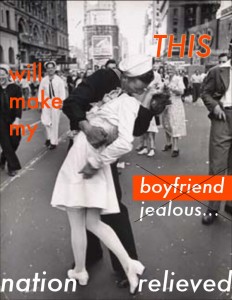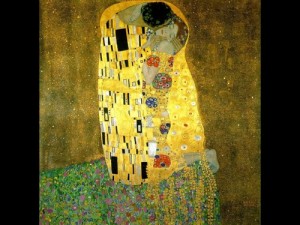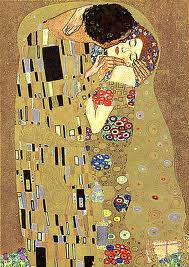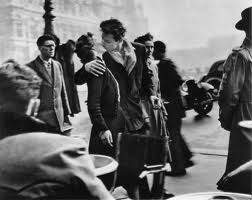I am now four days post-quals and the whole experience seems like a dream, a Dali-esque portrait of vibrant images stitched together crazily… The scene it describes is of a Western/technologized rite of passage whose equivalent is stripping you naked, feeding you peyote, and sending you out in the desert to channel strange visions and, hopefully, survive.
I’m still sleep-deprived but for different reasons: play, travel, and circadian rhythm compromise. I’m energized, though, to be among smart and friendly scholars in familiar Boston. Maybe this PhD is a bit like my 2003-2006 Boston experience — exciting in anticipation, surprisingly challenging in acclimation, depressing and identity-rocking at times, and ultimately, home.
Below, you’ll find what I wrote yesterday and perhaps appreciate, as I do now, how feelings can be ephemeral and how meaning-making is a continuous process…
__________________
I did it.
The thing is, I’m not sure what “it” is. Just what did I do? Here is an itemized list:
-worked from the moment I woke up until the time I went to sleep;
(-except for when I watched Top Chef: Season 4 – Chicago during my breakfast, lunch, and dinner + dishwashing breaks;)
-wrote a paper for two solid days*, then moved on to the next, despite the fact that the last section of the previous paper was unfinished and I hate leaving things unfinished, because I couldn’t risk getting bogged down and figured a slapdash last section to one (or several) papers was better than a non-existent or mostly inadequate paper in its entirety;
-went for a daily, two block walk for a cup of coffee to go;
-experienced two of the 10 days feeling cloudy-brained due to sleep deprivation, sympathizing with the concussed, strategizing work-arounds – making detailed notes since my silly cerebrum couldn’t hold a thought, going for a walk to the mailbox (can’t trust my postal carrier and your lack of Valentines is the reason – I mailed em, people), catching quick semi-naps, re-jiggering my 10-day plan;
-communicated with my beloved mother, my champion, daily;
-compromised my body’s structural integrity, perhaps (by the end of the experience, got the distinct impression that my posture kept tilting to the right – that ain’t ergonomic, and neither is my Ikea couch);
-rubbed the ends of my hair to frayed, eroded stumps;
-opted for loose dresses and my most generous jeans;
-managed to make it to yoga on both Sundays;
-got bites across my infernally expanding belly from some critter (a flea?) that I hope doesn’t live in my furniture;
-surprised myself by some of the routes that the papers took – hadn’t anticipated needing to get into X or Y topic, but realized I couldn’t speak about Z without foregrounding X and Y;
-cursed myself for these deviations from the plan because they necessitated searching for literature and adding the new citations to my stupid reference section;
-marveled at the sheer length of these documents, born of my ignorance that it would take so many pages to explain some fundamentals before I could even get into more of the “meat”;
-wondered…………..
Here’s the philosophical part and I’m warning you now, it’s not pretty. I wondered:
-if the fundamentals are the meat, if the point is to prove one’s mastery of theory and research methods;
-if the fundamentals aren’t the meat, if the point is to explore something novel, synthesize, make more of a contribution;
-who decides the point anyway – who is this for? While my professors may read these papers (I say “may” intentionally – I take nothing for granted, especially since I forked over behemoths), I’m not driven to please them necessarily, or other people in general, and doubt that honoring my own agenda will dissatisfy them, or anyone (and if it does cause dissatisfaction, tend to think that the refuseniks are in the wrong);
-then, if this is for me, how am I benefiting again? Where is the value in writing a paper in two days, on the back of another two day paper, another two day paper, another two day paper? Does that generate products of value? Are my papers any good?
-if it’s not about the product, it’s about the process, then is this nose-to-the-grindstone process one that confers any take-aways? Do I want to practice this, get better at this, this process of masochism and social disconnect? That doesn’t sound sustainable or qualify-of-life-y…
-if there’s something to be said about learning how to write on demand? Maaaaaaaybe, because procrastination and overcommitment can and has and will inspire two-day paper writing (I have a book chapter due next week, for example, and a conference and another deadline in the interim). But. Ugh. And that’s still just one or maybe two two-day papers, not four. And one or maybe two two-day papers, that I’ve done. I like to call that “finals.” So does doing four build up a muscle that makes two seem like cake? Like after a marathon, a 15-mile run is a breeze? If so, how long does that muscle last? It can’t be permanent – nothing is permanent. What will I have to do to maintain it? Is whatever that is worth it?
-if this is less of a body and muscle game, more of a brain and story game – maybe this builds up confidence or stokes a sense of self-image, as in “I can, I am — I can put something scholarly together, I am a scholar.” But can I, am I? What does middling performance prove? Whose standard are we using? Do I compare myself to professionals or am I still just a student? At the age of 31, when is my work legitimate? What is my work? Who defines legitimacy?
-Will any of these papers make a difference for me or anyone?
-Will any of my work make a difference for me or anyone? Does anyone know anything, or are we all just feeling around in the dark? If it’s the latter, then that would make my darkness-groping okay, or normative at least… But then how can we ever get anywhere? Stroke of luck? This isn’t about luck, this is about science. To what extent is it naïve to impose science’s order on the complexity of real life — dynamic systems, flesh-and-blood-and-mind-and-spirit people?
HOW DO I HELP PEOPLE?
How do I help myself? What am I doing?
To be honest, most of this emerged amorphously, intuitively, as it dawned on me that I couldn’t muster the energy to proof my papers and wondered what was the point of having worked so hard to perfect the reference sections (which no one will read) if the content is grammatically-challenged and flabby? This led me down the recrimination highway (Why hadn’t I uploaded everything to Zotero way back when and anytime since? (I know why. Time. (Why don’t I have any time? What am I doing wrong?))) and, sending the papers anyway, smashed headfirst into an existential crisis.
I cried.
Sobbing, I called my parents (as they kept running into neighbors at the Jewel, bless em), who sagely determined that I was overtired and would benefit from a good night’s sleep. True. Good point. But it was 7 pm. And I had grown accustomed to staying up until 2.
I took a walk down to the mailbox, downing seltzer from a travel mug because I thought maybe the sharp pain in my stomach that had been troubling me for hours was due to the fact that all I’d drank all day was that single cup of coffee to go… I continued on to Bricks & Scones, where there were no sesame chewy rolls, and maybe it was just as well. I trudged back home, wishing I felt better in every way, brainstorming…
The story ends well. Basically. I ended up dashing to an 8:10 pm show of Bridesmaids, where I ate an embezzled rice cake and granola bar in the dark and drank in the (synthesized?) Midwest, laughing at the broad comedy and recognizing another seasoned woman’s search for it all.
But we weren’t exactly the same, this character and me. I wear longer dresses, for starters, and I hadn’t hit rock bottom… right? I had finished my exams. I’m sure I’ll pass the defense. I wrote scads more than was expected (to our collective detriment?). I have read more than I cited (a mistake?) and still cited up a storm (the less interesting things?). I rediscovered pdf’s and hard copies of articles and books with my underlining + margin scribbling + Post It flagging, like gifts from a fairy godmother who was me, me, me leaving myself presents, Past Me to Future Me, taking care of me, three years in the making…
I don’t know. I don’t know what it was for. At least I can keep going on in this program. That’s good, to not be stranded along the PhD highway, surviving humiliation and a six-month waiting period before being permitted to sit for quals again. It’s good not to fail (although we’re supposed to celebrate mistakes, right, “teachable moments,” risk failure, seek failure, isn’t that part of the value-added in learning through gaming? – but failure feels different outside of games, it just does, and I know people who regret losing games anyway. This was a good bullet-dodge for my ego, not failing. (Am I being presumptuous? I haven’t passed the defense yet!)). I know, at least, that when it comes time to hunker down and focus and do, I can. I did. (What did I do again?)
My friends made me laugh. ☺ Via IM, email, telephone, text, postcard, face-to-face… Old friends, dear friends, good friends who I’ve been through the war with, even who I’ve warred with, busy but still finding the time to care, not just to show up in whichever mode availed but to bring their hearts with them and connect…
My family. My family is so generous, and I am so privileged, in every way.
The hell in my head, I created. I create. I know. It consists of phantasms and tricks of light. It can be blown away, like spun sugar, with a single burst of optimism, or humor, or gratitude. It can be transformed by looking at it from a different angle, a perspective shift. I know. I know.
You believe in me. I should believe in your good judgment. I deserve some slack, I guess. And a little more faith…
My intentions are pure. I just want it to matter. I don’t know about all of this work business. But I do know about all of you. You matter. I love you.
*note, I qualified the days as solid, not the papers… but if anyone would like to read one or any of the papers, here are the links:
Participation and play: Modes of learning for today and tomorrow
“Almost as necessary as bread”: Why we need narrative and what makes it work
The origin of everything?: Empathy in theory and practice
Present promise, future potential: Positive Deviance and complementary theory





